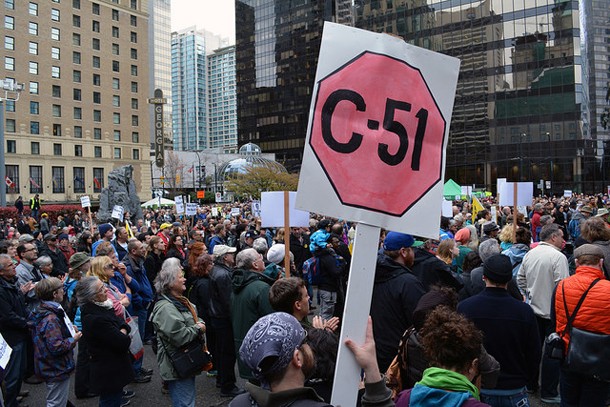How Canadians can end mass surveillance
A version of this article by our David Christopher was originally published by The Tyee, as part of a new series about Canada's Privacy Plan Just two short years ago, if you stopped people on the street and asked about mass surveillance, you’d have likely been met with a blank stare. Older generations may have brought up scenes from long-toppled totalitarian regimes, such as the system of ubiquitous domestic surveillance designed by East Germany’s spy agency, the Stasi.
Others may have raised China’s extensive surveillance and censorship of the Internet. But very few would have expressed fears that the governments of western democracies, such as the U.S., Britain, and Canada, were engaged in the mass surveillance of law-abiding citizens.
That all changed in June 2013, when Edward Snowden, a contractor at the U.S. National Security Agency (NSA), blew the whistle on the previously unimaginable extent of the spying activities of the NSA and its Five Eyes partners in Canada, Australia, New Zealand, and the U.K.
In addition to published abuses by our international surveillance partners, we’ve also seen a long stream of revelations about how Canada’s Communications Security Establishment (CSE) is engaged in extensive spying on private online activities.
To give just a few examples, we learned that CSE spied on law-abiding Canadians using the free wi-fi at Pearson airport, and monitored their movements for weeks afterward. We learned that CSE is monitoring an astonishing 15 million file downloads a day, with Canadian Internet addresses among the targets.
Even emails Canadians send to the government or their local MP are being spied on - up to 400,000 a day according to CBC news. Just last week we discovered that CSE is targeting widely-used mobile web browsers and app stores. Many of these activities are not authorized by a judge, but instead through secret ministerial authorizations such as those issued by MP Peter MacKay in 2011.
CSE is not the only part of the government engaged in mass surveillance. Late last year it was revealed that the government was creating new systems for collecting and analyzing what Canadians say on Facebook and other social media services. As a result, the fear of getting caught in the government’s dragnet surveillance is one more and more Canadians may soon face.
Now, this climate of fear is something many people are concerned about. The issue of blanket surveillance came up again and again in the crowdsourcing work our organization did for Canada’s Privacy Plan, the pro-privacy action plan we launched last week.
Canadians who contacted us expressed concern about the implications of mass surveillance for democracy. As crowdsourcing participant Anne-Marie said:
“Part of the deal in being a citizen of a free society is the expectation that our personal affairs and physical person are inviolable as long as we remain within the law.”
When we presented crowdsourcing participants with a choice of privacy priorities, “End blanket surveillance of law-abiding people” came a very close second. And there was overwhelming support for reining in specific surveillance activities:
93.8% want to end blanket surveillance of law-abiding people.
89.1% want all surveillance activities to require a warrant approved by a judge.
92.2% want to forbid security agencies from monitoring peaceful individuals and groups not posing a threat to national security.

These findings are echoed by independent studies, including the federal Privacy Commissioner’s 2014 survey that found 77% of Canadians are concerned about security agencies collecting their information for surveillance purposes.
Many are asking whether anything can be done to rein in the almost unimaginable surveillance powers revealed by Edward Snowden. In fact, from our research and consultation with privacy experts, there are a number of practical steps that can be taken to put a stop to surveillance abuses and better protect the privacy of Canadians. These include:
Ordering CSE and CSIS to end all suspicionless surveillance activities that are directed against the general public, ensuring that all spying is directed at a specific target, and only when authorized by an impartial judge, not a government minister.
Preventing any future expansion of surveillance without an open debate and a clearly verifiable need.
Preventing government agencies from systematically collecting and monitoring what Canadians say on social media - when people post on Facebook they believe they’re sharing with family and friends, not with a government bureaucrat in Ottawa.
Making future cooperation with the Five Eyes spy alliance contingent on their compliance with strong international human rights principles and the Charter of Rights and Freedoms - at a minimum meaning an end to all programs of mass online spying.
The need for action is clear. Behind the backs of their citizens, governments, including Canada’s, are building building surveillance tools more powerful than anything humanity has seen before – systems that make those deployed by the Stasi and China look crude by comparison.
There is a very real risk now that the Internet, the greatest tool for connectivity that humankind has ever built, could instead become a tool for governments to spy on everybody, with potentially devastating consequences for democracy.
In other countries, the tide appears to be turning in this debate. In the U.S., it looks like aspects of NSA surveillance are about to be rolled back for the first time in over a decade. It’s time for Canada to catch up.
Readers can learn more about these and other steps to end mass surveillance and restore privacy by checking out our action plan at PrivacyPlan.ca and by sending it to decision-makers.




 Take action now!
Take action now!
 Sign up to be in the loop
Sign up to be in the loop
 Donate to support our work
Donate to support our work